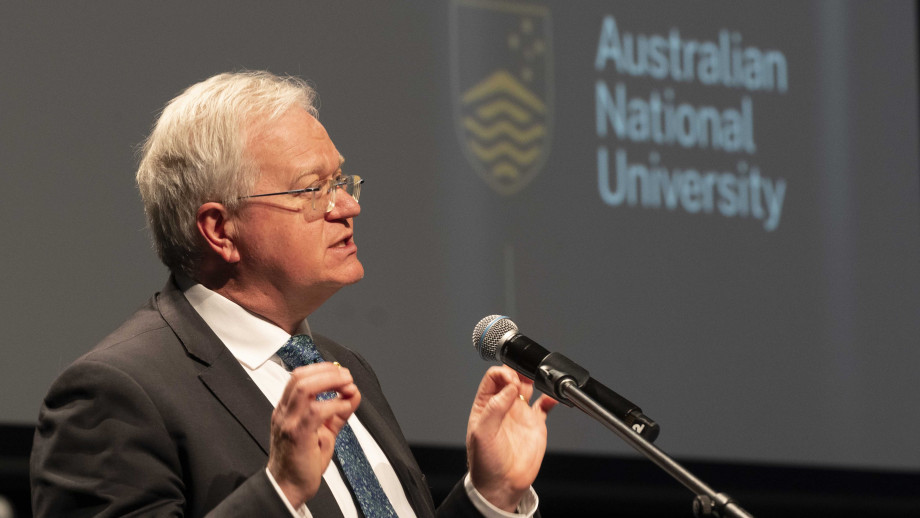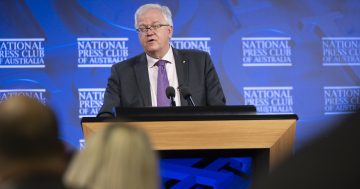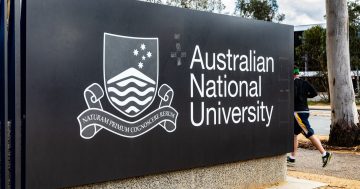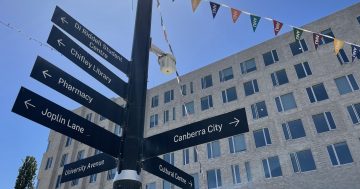
ANU Vice-Chancellor Professor Brian Schmidt said the land purchase was a ‘once-in-a-generation’ opportunity. Photo: File.
A former car park will be transformed into a home for health treatment and research following a deal between the Australian National University (ANU) and the ACT Government.
The ANU has secured the 8600 square metre block on the corner of Marcus Clarke and Gordon streets for $16.75 million to build a national health precinct.
ANU Vice-Chancellor Professor Brian Schmidt said it was a “once-in-a-generation opportunity” to secure the land.
“This block of land was the missing piece of our campus and future generations of students and academics will thank us for seizing the opportunity to buy it,” he said.
“We will use this site to bring together research, teaching, policy, treatment and public engagement to understand and meet Australia’s future health needs, which is a key part of our mission as the national university.
“It will be a transformational precinct, not just for the ANU but for the nation.”
The block is currently being used as a depot for the raising of London Circuit and stands adjacent to the National Health and Medical Research headquarters and the Australian Academy of Science.
The new complex is a long way off, though. The building work is expected to take six years once commercial partners are found to fully fund the construction, which is expected to be into the hundreds of millions of dollars.
The site also cannot be accessed until light rail in the area has been completed.
It’s expected to house the university’s work on public health, biomedical science, medicine and psychology, as well as being a place where research in next-generation personalised precision medicine is transformed into treatments available to the community.
It will also have space for health-focused organisations and agencies, clinical services, engagement and learning opportunities, and related retail.
Professor Schmidt said the purchase of the land had been included in the university’s council-approved budget and five-year financial plan, and preliminary sketches had already been done.
The land could allow for a 35,000 square-metre building, and Professor Schmidt said he had visions of it allowing for the creation of advanced therapies which were currently “unknown today”.
“So think about therapies and ways of tackling disease that are five years in the future that are not known, it’s not just business as usual, it’s the future, that’s what’s going to be in this building,” he said.
“What we’re doing here is going to be big.”
The land was purchased through direct sale negotiations between the ANU and the government.
Chief Minister Andrew Barr said the purchase would generate important and ongoing health, education and economic benefits for the Territory.
“The sale will see the under-utilised land transformed into a nationally significant health precinct,” he said.
“Cabinet considered the value of this partnership with the ANU being greater than just releasing the site to the general market for any major purposes.”
It was also hoped the new precinct would bring more life and activity to this part of the CBD.
“The ACT Government is investing in the revitalisation of the city centre and this important investment from ANU will further integrate the university into the heart of our city,” Mr Barr said.
“From my perspective, the Territory economy and the social and cultural life of Canberra are always improved when our universities engage and partner with the Territory government.
“When our universities are strong, then our economy and our city are strong.”
However, not everyone is happy with the announcement.
The National Tertiary Education Union voiced its criticism of the sale, given difficulties around pay negotiations with staff.
ACT division secretary Dr Lachlan Clohesy said this showed the ANU was able to find the money when it came to land, but not when it came to staff and students.
“Staff have been told that the ANU is losing money and that the cupboard is bare,” he said.
“With this land purchase, ANU’s claims that the cupboard is bare are difficult to believe.”
He accused the university of offering staff a pay rise which would have been the “worst negotiated outcome” in the sector and called on the ANU to up its game.
“ANU is a wealthy university and can afford to pay staff fairly,” Dr Clohesy said.
“Unless ANU similarly prioritises giving staff a fair pay rise, staff at the ANU will strike on 27 July.”



















